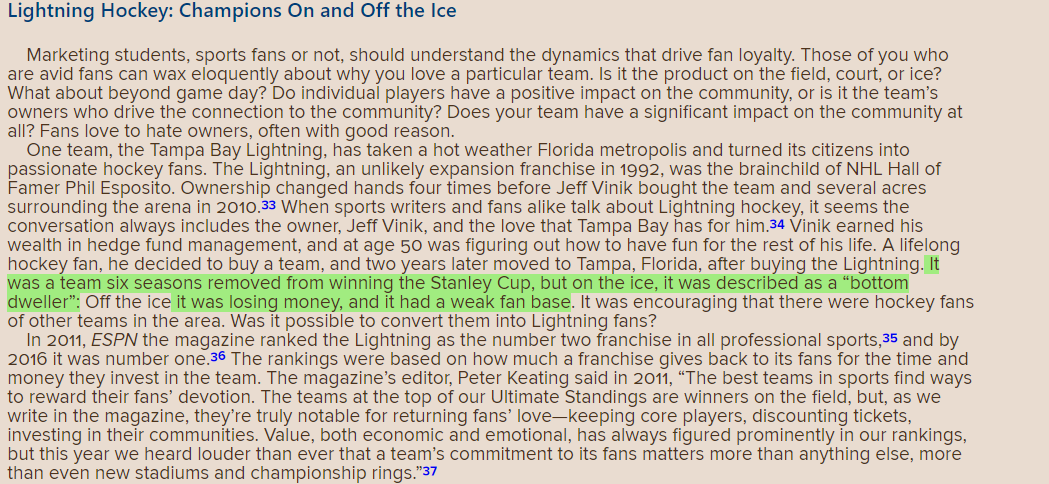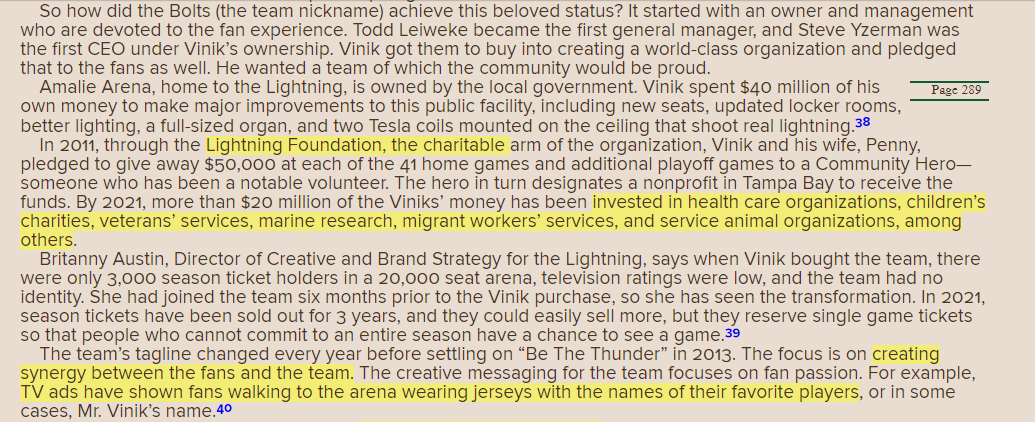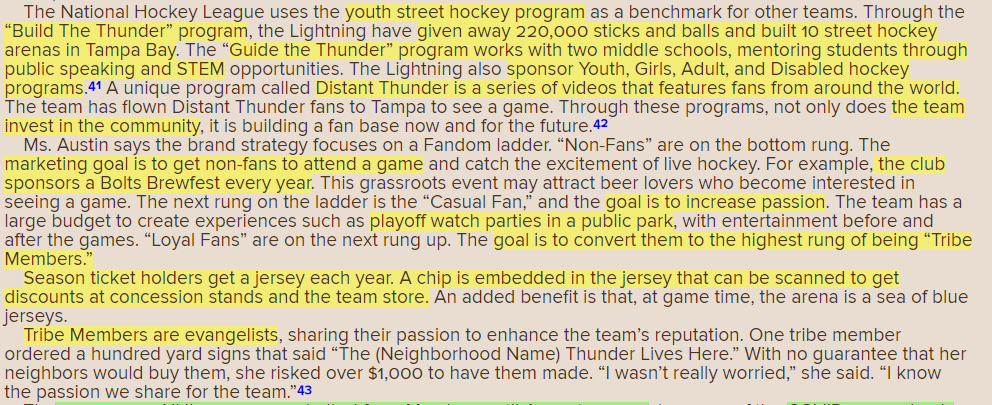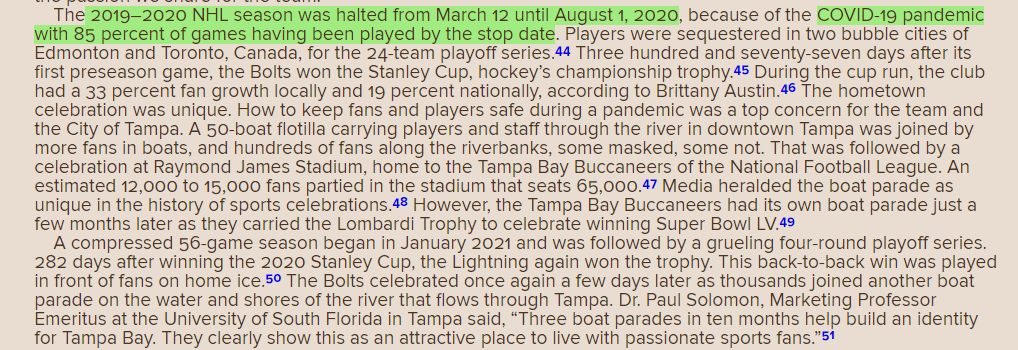Answered step by step
Verified Expert Solution
Question
1 Approved Answer
PLEASE HELP!!! (DO NOT MIND THE HIGHLIGHTED TEXED AS THEY ARE FROM A PREVIOUS ASSIGNMENT THANK YOU IN ADVANCE FOR YOUR HELP!!!! MANAGEMENT DECISION CASE:
PLEASE HELP!!! (DO NOT MIND THE HIGHLIGHTED TEXED AS THEY ARE FROM A PREVIOUS ASSIGNMENT THANK YOU IN ADVANCE FOR YOUR HELP!!!!
MANAGEMENT DECISION CASE:
Analyze and record the problems in the case and identify their core elements. (pertaining to Marketing Management)



 The National Hockey League uses the youth street hockey program as a benchmark for other teams. Through the "Build The Thunder" program, the Lightning have given away 220,000 sticks and balls and built 10 street hockey arenas in Tampa Bay. The "Guide the Thunder" program works with two middle schools, mentoring students through public speaking and STEM opportunities. The Lightning also sponsor Youth, Girls, Adult, and Disabled hockey programs. 41A unique program called Distant Thunder is a series of videos that features fans from around the world. The team has flown Distant Thunder fans to Tampa to see a game. Through these programs, not only does the team invest in the community, it is building a fan base now and for the future. 42 Ms. Austin says the brand strategy focuses on a Fandom ladder. "Non-Fans" are on the bottom rung. The marketing goal is to get non-fans to attend a game and catch the excitement of live hockey. For example, the club sponsors a Bolts Brewfest every year. This grassroots event may attract beer lovers who become interested in seeing a game. The next rung on the ladder is the "Casual Fan," and the goal is to increase passion. The team has a large budget to create experiences such as playoff watch parties in a public park, with entertainment before and after the games. "Loyal Fans" are on the next rung up. The goal is to convert them to the highest rung of being "Tribe Members." Season ticket holders get a jersey each year. A chip is embedded in the jersey that can be scanned to get discounts at concession stands and the team store. An added benefit is that, at game time, the arena is a sea of blue jerseys. Tribe Members are evangelists, sharing their passion to enhance the team's reputation. One tribe member ordered a hundred yard signs that said "The (Neighborhood Name) Thunder Lives Here." With no guarantee that her neighbors would buy them, she risked over $1,000 to have them made. "I wasn't really worried," she said. "I know the passion we share for the team." 43 The 2019-2020 NHL season was halted from March 12 until August 1, 2020, because of the COVID-19 pandemic with 85 percent of games having been played by the stop date. Players were sequestered in two bubble cities of Edmonton and Toronto, Canada, for the 24-team playoff series.44 Three hundred and seventy-seven days after its first preseason game, the Bolts won the Stanley Cup, hockey's championship trophy.45 During the cup run, the club had a 33 percent fan growth locally and 19 percent nationally, according to Brittany Austin. 46 The hometown celebration was unique. How to keep fans and players safe during a pandemic was a top concern for the team and the City of Tampa. A 50-boat flotilla carrying players and staff through the river in downtown Tampa was joined by more fans in boats, and hundreds of fans along the riverbanks, some masked, some not. That was followed by a celebration at Raymond James Stadium, home to the Tampa Bay Buccaneers of the National Football League. An estimated 12,000 to 15,000 fans partied in the stadium that seats 65,000.47 Media heralded the boat parade as unique in the history of sports celebrations. 48 However, the Tampa Bay Buccaneers had its own boat parade just a few months later as they carried the Lombardi Trophy to celebrate winning Super Bowl LV.49 A compressed 56-game season began in January 2021 and was followed by a grueling four-round playoff series. 282 days after winning the 2020 Stanley Cup, the Lightning again won the trophy. This back-to-back win was played in front of fans on home ice. 50 The Bolts celebrated once again a few days later as thousands joined another boat parade on the water and shores of the river that flows through Tampa. Dr. Paul Solomon, Marketing Professor Emeritus at the University of South Florida in Tampa said, "Three boat parades in ten months help build an identity for Tampa Bay. They clearly show this as an attractive place to live with passionate sports fans." 51 So how did the Bolts (the team nickname) achieve this beloved status? It started with an owner and management who are devoted to the fan experience. Todd Leiweke became the first general manager, and Steve Yzerman was the first CEO under Vinik's ownership. Vinik got them to buy into creating a world-class organization and pledged that to the fans as well. He wanted a team of which the community would be proud. Amalie Arena, home to the Lightning, is owned by the local government. Vinik spent \$40 million of his Page 289 own money to make major improvements to this public facility, including new seats, updated locker rooms, better lighting, a full-sized organ, and two Tesla coils mounted on the ceiling that shoot real lightning. 38 In 2011, through the Lightning Foundation, the charitable arm of the organization, Vinik and his wife, Penny, pledged to give away $50,000 at each of the 41 home games and additional playoff games to a Community Herosomeone who has been a notable volunteer. The hero in turn designates a nonprofit in Tampa Bay to receive the funds. By 2021, more than $20 million of the Viniks' money has been invested in health care organizations, children's charities, veterans' services, marine research, migrant workers' services, and service animal organizations, among others. Britanny Austin, Director of Creative and Brand Strategy for the Lightning, says when Vinik bought the team, there were only 3,000 season ticket holders in a 20,000 seat arena, television ratings were low, and the team had no identity. She had joined the team six months prior to the Vinik purchase, so she has seen the transformation. In 2021 , season tickets have been sold out for 3 years, and they could easily sell more, but they reserve single game tickets so that people who cannot commit to an entire season have a chance to see a game.39 The team's tagline changed every year before settling on "Be The Thunder" in 2013. The focus is on creating synergy between the fans and the team. The creative messaging for the team focuses on fan passion. For example, TV ads have shown fans walking to the arena wearing jerseys with the names of their favorite players, or in some cases, Mr. Vinik's name 40 Marketing students, sports fans or not, should understand the dynamics that drive fan loyalty. Those of you who are avid fans can wax eloquently about why you love a particular team. Is it the product on the field, court, or ice? What about beyond game day? Do individual players have a positive impact on the community, or is it the team's owners who drive the connection to the community? Does your team have a significant impact on the community at all? Fans love to hate owners, often with good reason. One team, the Tampa Bay Lightning, has taken a hot weather Florida metropolis and turned its citizens into passionate hockey fans. The Lightning, an unlikely expansion franchise in 1992, was the brainchild of NHL Hall of Famer Phil Esposito. Ownership changed hands four times before Jeff Vinik bought the team and several acres surrounding the arena in 2010.33 When sports writers and fans alike talk about Lightning hockey, it seems the conversation always includes the owner, Jeff Vinik, and the love that Tampa Bay has for him.34 Vinik earned his wealth in hedge fund management, and at age 50 was figuring out how to have fun for the rest of his life. A lifelong hockey fan, he decided to buy a team, and two years later moved to Tampa, Florida, after buying the Lightning. It was a team six seasons removed from winning the Stanley Cup, but on the ice, it was described as a "bottom dweller": Off the ice it was losing money, and it had a weak fan base. It was encouraging that there were hockey fans of other teams in the area. Was it possible to convert them into Lightning fans? In 2011, ESPN the magazine ranked the Lightning as the number two franchise in all professional sports,35 and by 2016 it was number one.36 The rankings were based on how much a franchise gives back to its fans for the time and money they invest in the team. The magazine's editor, Peter Keating said in 2011, "The best teams in sports find ways to reward their fans' devotion. The teams at the top of our Ultimate Standings are winners on the field, but, as we write in the magazine, they're truly notable for returning fans' love-keeping core players, discounting tickets, investing in their communities. Value, both economic and emotional, has always figured prominently in our rankings, but this year we heard louder than ever that a team's commitment to its fans matters more than anything else, more than even new stadiums and championship rings." 37
The National Hockey League uses the youth street hockey program as a benchmark for other teams. Through the "Build The Thunder" program, the Lightning have given away 220,000 sticks and balls and built 10 street hockey arenas in Tampa Bay. The "Guide the Thunder" program works with two middle schools, mentoring students through public speaking and STEM opportunities. The Lightning also sponsor Youth, Girls, Adult, and Disabled hockey programs. 41A unique program called Distant Thunder is a series of videos that features fans from around the world. The team has flown Distant Thunder fans to Tampa to see a game. Through these programs, not only does the team invest in the community, it is building a fan base now and for the future. 42 Ms. Austin says the brand strategy focuses on a Fandom ladder. "Non-Fans" are on the bottom rung. The marketing goal is to get non-fans to attend a game and catch the excitement of live hockey. For example, the club sponsors a Bolts Brewfest every year. This grassroots event may attract beer lovers who become interested in seeing a game. The next rung on the ladder is the "Casual Fan," and the goal is to increase passion. The team has a large budget to create experiences such as playoff watch parties in a public park, with entertainment before and after the games. "Loyal Fans" are on the next rung up. The goal is to convert them to the highest rung of being "Tribe Members." Season ticket holders get a jersey each year. A chip is embedded in the jersey that can be scanned to get discounts at concession stands and the team store. An added benefit is that, at game time, the arena is a sea of blue jerseys. Tribe Members are evangelists, sharing their passion to enhance the team's reputation. One tribe member ordered a hundred yard signs that said "The (Neighborhood Name) Thunder Lives Here." With no guarantee that her neighbors would buy them, she risked over $1,000 to have them made. "I wasn't really worried," she said. "I know the passion we share for the team." 43 The 2019-2020 NHL season was halted from March 12 until August 1, 2020, because of the COVID-19 pandemic with 85 percent of games having been played by the stop date. Players were sequestered in two bubble cities of Edmonton and Toronto, Canada, for the 24-team playoff series.44 Three hundred and seventy-seven days after its first preseason game, the Bolts won the Stanley Cup, hockey's championship trophy.45 During the cup run, the club had a 33 percent fan growth locally and 19 percent nationally, according to Brittany Austin. 46 The hometown celebration was unique. How to keep fans and players safe during a pandemic was a top concern for the team and the City of Tampa. A 50-boat flotilla carrying players and staff through the river in downtown Tampa was joined by more fans in boats, and hundreds of fans along the riverbanks, some masked, some not. That was followed by a celebration at Raymond James Stadium, home to the Tampa Bay Buccaneers of the National Football League. An estimated 12,000 to 15,000 fans partied in the stadium that seats 65,000.47 Media heralded the boat parade as unique in the history of sports celebrations. 48 However, the Tampa Bay Buccaneers had its own boat parade just a few months later as they carried the Lombardi Trophy to celebrate winning Super Bowl LV.49 A compressed 56-game season began in January 2021 and was followed by a grueling four-round playoff series. 282 days after winning the 2020 Stanley Cup, the Lightning again won the trophy. This back-to-back win was played in front of fans on home ice. 50 The Bolts celebrated once again a few days later as thousands joined another boat parade on the water and shores of the river that flows through Tampa. Dr. Paul Solomon, Marketing Professor Emeritus at the University of South Florida in Tampa said, "Three boat parades in ten months help build an identity for Tampa Bay. They clearly show this as an attractive place to live with passionate sports fans." 51 So how did the Bolts (the team nickname) achieve this beloved status? It started with an owner and management who are devoted to the fan experience. Todd Leiweke became the first general manager, and Steve Yzerman was the first CEO under Vinik's ownership. Vinik got them to buy into creating a world-class organization and pledged that to the fans as well. He wanted a team of which the community would be proud. Amalie Arena, home to the Lightning, is owned by the local government. Vinik spent \$40 million of his Page 289 own money to make major improvements to this public facility, including new seats, updated locker rooms, better lighting, a full-sized organ, and two Tesla coils mounted on the ceiling that shoot real lightning. 38 In 2011, through the Lightning Foundation, the charitable arm of the organization, Vinik and his wife, Penny, pledged to give away $50,000 at each of the 41 home games and additional playoff games to a Community Herosomeone who has been a notable volunteer. The hero in turn designates a nonprofit in Tampa Bay to receive the funds. By 2021, more than $20 million of the Viniks' money has been invested in health care organizations, children's charities, veterans' services, marine research, migrant workers' services, and service animal organizations, among others. Britanny Austin, Director of Creative and Brand Strategy for the Lightning, says when Vinik bought the team, there were only 3,000 season ticket holders in a 20,000 seat arena, television ratings were low, and the team had no identity. She had joined the team six months prior to the Vinik purchase, so she has seen the transformation. In 2021 , season tickets have been sold out for 3 years, and they could easily sell more, but they reserve single game tickets so that people who cannot commit to an entire season have a chance to see a game.39 The team's tagline changed every year before settling on "Be The Thunder" in 2013. The focus is on creating synergy between the fans and the team. The creative messaging for the team focuses on fan passion. For example, TV ads have shown fans walking to the arena wearing jerseys with the names of their favorite players, or in some cases, Mr. Vinik's name 40 Marketing students, sports fans or not, should understand the dynamics that drive fan loyalty. Those of you who are avid fans can wax eloquently about why you love a particular team. Is it the product on the field, court, or ice? What about beyond game day? Do individual players have a positive impact on the community, or is it the team's owners who drive the connection to the community? Does your team have a significant impact on the community at all? Fans love to hate owners, often with good reason. One team, the Tampa Bay Lightning, has taken a hot weather Florida metropolis and turned its citizens into passionate hockey fans. The Lightning, an unlikely expansion franchise in 1992, was the brainchild of NHL Hall of Famer Phil Esposito. Ownership changed hands four times before Jeff Vinik bought the team and several acres surrounding the arena in 2010.33 When sports writers and fans alike talk about Lightning hockey, it seems the conversation always includes the owner, Jeff Vinik, and the love that Tampa Bay has for him.34 Vinik earned his wealth in hedge fund management, and at age 50 was figuring out how to have fun for the rest of his life. A lifelong hockey fan, he decided to buy a team, and two years later moved to Tampa, Florida, after buying the Lightning. It was a team six seasons removed from winning the Stanley Cup, but on the ice, it was described as a "bottom dweller": Off the ice it was losing money, and it had a weak fan base. It was encouraging that there were hockey fans of other teams in the area. Was it possible to convert them into Lightning fans? In 2011, ESPN the magazine ranked the Lightning as the number two franchise in all professional sports,35 and by 2016 it was number one.36 The rankings were based on how much a franchise gives back to its fans for the time and money they invest in the team. The magazine's editor, Peter Keating said in 2011, "The best teams in sports find ways to reward their fans' devotion. The teams at the top of our Ultimate Standings are winners on the field, but, as we write in the magazine, they're truly notable for returning fans' love-keeping core players, discounting tickets, investing in their communities. Value, both economic and emotional, has always figured prominently in our rankings, but this year we heard louder than ever that a team's commitment to its fans matters more than anything else, more than even new stadiums and championship rings." 37 Step by Step Solution
There are 3 Steps involved in it
Step: 1

Get Instant Access to Expert-Tailored Solutions
See step-by-step solutions with expert insights and AI powered tools for academic success
Step: 2

Step: 3

Ace Your Homework with AI
Get the answers you need in no time with our AI-driven, step-by-step assistance
Get Started


